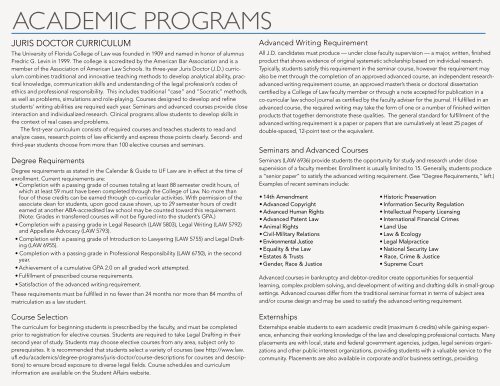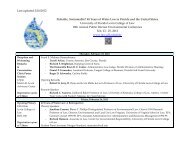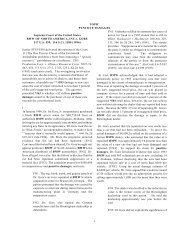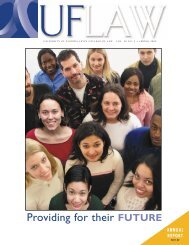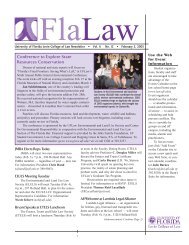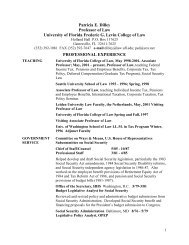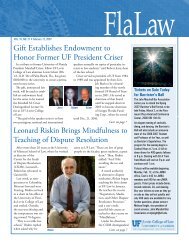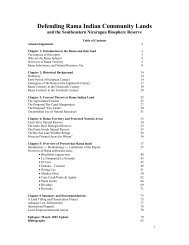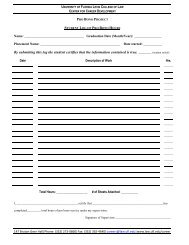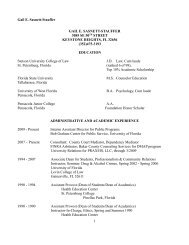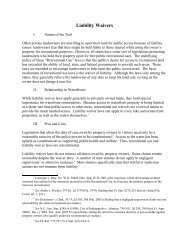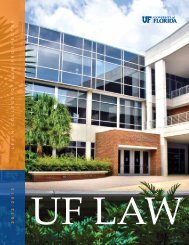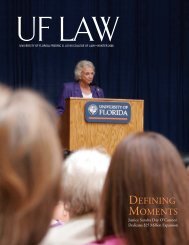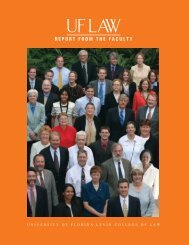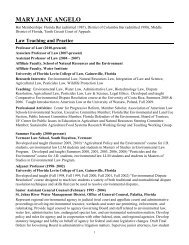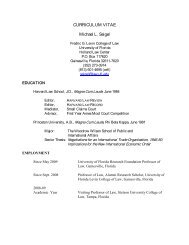Academic ProgramsJuris Doc<strong>to</strong>r CurriculumThe University <strong>of</strong> Florida <strong>College</strong> <strong>of</strong> <strong>Law</strong> was founded in 1909 and named in honor <strong>of</strong> alumnusFredric G. <strong>Levin</strong> in 1999. The college is accredited by the American Bar Association and is amember <strong>of</strong> the Association <strong>of</strong> American <strong>Law</strong> Schools. Its three-year Juris Doc<strong>to</strong>r (J.D.) curriculumcombines traditional and innovative teaching methods <strong>to</strong> develop analytical ability, practicalknowledge, communication skills and understanding <strong>of</strong> the legal pr<strong>of</strong>ession’s codes <strong>of</strong>ethics and pr<strong>of</strong>essional responsibility. This includes traditional “case” and “Socratic” methods,as well as problems, simulations and role-playing. Courses designed <strong>to</strong> develop and refinestudents’ writing abilities are required each year. Seminars and advanced courses provide closeinteraction and individualized research. Clinical programs allow students <strong>to</strong> develop skills inthe context <strong>of</strong> real cases and problems.The first-year curriculum consists <strong>of</strong> required courses and teaches students <strong>to</strong> read andanalyze cases, research points <strong>of</strong> <strong>law</strong> efficiently and express those points clearly. Second- andthird-year students choose from more than 100 elective courses and seminars.Degree RequirementsDegree requirements as stated in the <strong>Calendar</strong> & <strong>Guide</strong> <strong>to</strong> UF <strong>Law</strong> are in effect at the time <strong>of</strong>enrollment. Current requirements are:• Completion with a passing grade <strong>of</strong> courses <strong>to</strong>taling at least 88 semester credit hours, <strong>of</strong>which at least 59 must have been completed through the <strong>College</strong> <strong>of</strong> <strong>Law</strong>. No more thanfour <strong>of</strong> those credits can be earned through co-curricular activities. With permission <strong>of</strong> theassociate dean for students, upon good cause shown, up <strong>to</strong> 29 semester hours <strong>of</strong> creditearned at another ABA-accredited <strong>law</strong> school may be counted <strong>to</strong>ward this requirement.(Note: Grades in transferred courses will not be figured in<strong>to</strong> the student’s GPA.)• Completion with a passing grade in Legal Research (LAW 5803), Legal Writing (LAW 5792)and Appellate Advocacy (LAW 5793).• Completion with a passing grade <strong>of</strong> Introduction <strong>to</strong> <strong>Law</strong>yering (LAW 5755) and Legal Drafting(LAW 6955).• Completion with a passing grade in Pr<strong>of</strong>essional Responsibility (LAW 6750), in the secondyear.• Achievement <strong>of</strong> a cumulative GPA 2.0 on all graded work attempted.• Fulfillment <strong>of</strong> prescribed course requirements.• Satisfaction <strong>of</strong> the advanced writing requirement.These requirements must be fulfilled in no fewer than 24 months nor more than 84 months <strong>of</strong>matriculation as a <strong>law</strong> student.Course SelectionThe curriculum for beginning students is prescribed by the faculty, and must be completedprior <strong>to</strong> registration for elective courses. Students are required <strong>to</strong> take Legal Drafting in theirsecond year <strong>of</strong> study. Students may choose elective courses from any area, subject only <strong>to</strong>prerequisites. It is recommended that students select a variety <strong>of</strong> courses (see http://www.<strong>law</strong>.ufl.edu/academics/degree-programs/juris-doc<strong>to</strong>r/course-descriptions for courses and descriptions)<strong>to</strong> ensure broad exposure <strong>to</strong> diverse legal fields. Course schedules and curriculuminformation are available on the Student Affairs website.Advanced Writing RequirementAll J.D. candidates must produce — under close faculty supervision — a major, written, finishedproduct that shows evidence <strong>of</strong> original systematic scholarship based on individual research.Typically, students satisfy this requirement in the seminar course, however the requirement mayalso be met through the completion <strong>of</strong> an approved advanced course, an independent researchadvancedwriting requirement course, an approved master’s thesis or doc<strong>to</strong>ral dissertationcertified by a <strong>College</strong> <strong>of</strong> <strong>Law</strong> faculty member or through a note accepted for publication in aco-curricular <strong>law</strong> school journal as certified by the faculty adviser for the journal. If fulfilled in anadvanced course, the required writing may take the form <strong>of</strong> one or a number <strong>of</strong> finished writtenproducts that <strong>to</strong>gether demonstrate these qualities. The general standard for fulfillment <strong>of</strong> theadvanced writing requirement is a paper or papers that are cumulatively at least 25 pages <strong>of</strong>double-spaced, 12-point text or the equivalent.Seminars and Advanced CoursesSeminars (LAW 6936) provide students the opportunity for study and research under closesupervision <strong>of</strong> a faculty member. Enrollment is usually limited <strong>to</strong> 15. Generally, students producea “senior paper” <strong>to</strong> satisfy the advanced writing requirement. (See “Degree Requirements,” left.)Examples <strong>of</strong> recent seminars include:• 14th Amendment• Advanced Copyright• Advanced Human Rights• Advanced Patent <strong>Law</strong>• Animal Rights• Civil-Military Relations• Environmental Justice• Equality & the <strong>Law</strong>• Estates & Trusts• Gender, Race & Justice• His<strong>to</strong>ric Preservation• Information Security Regulation• Intellectual Property Licensing• International Financial Crimes• Land Use• <strong>Law</strong> & Ecology• Legal Malpractice• National Security <strong>Law</strong>• Race, Crime & Justice• Supreme CourtAdvanced courses in bankruptcy and deb<strong>to</strong>r-credi<strong>to</strong>r create opportunities for sequentiallearning, complex problem solving, and development <strong>of</strong> writing and drafting skills in small-groupsettings. Advanced courses differ from the traditional seminar format in terms <strong>of</strong> subject areaand/or course design and may be used <strong>to</strong> satisfy the advanced writing requirement.ExternshipsExternships enable students <strong>to</strong> earn academic credit (maximum 6 credits) while gaining experience,enhancing their working knowledge <strong>of</strong> the <strong>law</strong> and developing pr<strong>of</strong>essional contacts. Manyplacements are with local, state and federal government agencies, judges, legal services organizationsand other public interest organizations, providing students with a valuable service <strong>to</strong> thecommunity. Placements are also available in corporate and/or business settings, providing
students valuable experiences in this area <strong>of</strong> the <strong>law</strong>. In addition <strong>to</strong> hours spent in the workplace,externships require a manda<strong>to</strong>ry orientation and regular contact and guided reflection with a facultymember. Every externship is supervised by a <strong>law</strong> school faculty member as well as an at<strong>to</strong>rney at theworkplace.Skills TrainingStrong writing skills critical <strong>to</strong> the legal pr<strong>of</strong>ession are refined through required courses in LegalResearch, Legal Writing, Appellate Advocacy, and Legal Drafting in the first two years, plus theadvanced writing requirement. Students gain practical experience through coursework — includingadvocacy and trial practice instruction — as well as externships and other opportunities.Florida’s clinical programs allow students <strong>to</strong> represent actual clients within an academic frameworkwith a substantial classroom component.*Virgil Hawkins Civil Clinics - Family Advocacy: Students represent indigent clients as first-chaircounsel, from the initial interview, pleadings, discovery, and mediation, through non-jury trial,primarily in family <strong>law</strong> cases; Intimate Partner Violence Assistance Clinic: A collaboration between the<strong>College</strong> <strong>of</strong> <strong>Law</strong>, <strong>College</strong> <strong>of</strong> Medecine, Shands Teaching Hospital and Peaceful Paths Domestic AbuseNetwork, in which students provide low-income intimate partner violence victims with comprehensiveand coordinated legal, medical and social services focusing on victim and family safety; Pro Se:Students give advice and counsel <strong>to</strong> litigants representing themselves in family court, determine withtheir clients on an individual basis what services they will provide, ranging from legal advice, assistingwith mediation, and court representation; Juvenile: Students advocate for children in many types <strong>of</strong>civil, criminal and administrative proceedings.*While participating in the Criminal <strong>Law</strong> Clinics (Prosecution or Defense), students intern in the <strong>of</strong>fices<strong>of</strong> the state at<strong>to</strong>rney or the public defender while also attending clinical lectures and simulationbasedclasses. Students will become familiar with court proceedings such as first appearances, bailhearings, arraignments, pleas, sentencing hearings and jury trials, and will put their understanding<strong>of</strong> procedural rules, constitutional implications, and advocacy <strong>to</strong> the test in the complex world <strong>of</strong>criminal practice.*Mediation – when satisfac<strong>to</strong>rily completed, in addition <strong>to</strong> other requirements – will ultimately qualifystudents <strong>to</strong> become county court media<strong>to</strong>rs, certified by the Florida Supreme Court.*Conservation – <strong>of</strong>fers both <strong>law</strong> and graduate students the opportunity <strong>to</strong> work on cutting-edgeenvironmental and land use <strong>law</strong> and policy issues.*Civil and Criminal Clinic students must have completed at least 48 semester credit hours and arecertified by the Florida Supreme Court <strong>to</strong> practice <strong>law</strong> under a supervising at<strong>to</strong>rney. Students aregenerally limited <strong>to</strong> one clinic each.Enrollment in clinics is limited <strong>to</strong> ensure close supervision, and students are encouraged <strong>to</strong> takeadvantage <strong>of</strong> other available opportunities <strong>to</strong> gain practical experience. Students can experienceaspects <strong>of</strong> <strong>law</strong> practice with organizations and agencies through pro bono work, part-time jobs orexternships.Independent StudyThe Independent Study (IS) program enables students <strong>to</strong> work directly with, and under men<strong>to</strong>rship<strong>of</strong>, faculty members in their area <strong>of</strong> expertise, making it easier for students <strong>to</strong> pursue special interests.Students must be in good academic standing and have completed their third term, obtainedconsent <strong>of</strong> a faculty sponsor and agreed on the number <strong>of</strong> credits. Students complete — underfaculty supervision — an independent research project that includes per-credit reading and writingcomponents at least commensurate with those <strong>of</strong> a <strong>law</strong> school seminar. (Note: IS courses do not fulfillthe advanced writing requirement.) IS courses are graded pass/fail (S/U), and students may takeup <strong>to</strong> two credits in any one term. Credits for the Independent Study Course and the IndependentResearch — Advanced Writing course <strong>to</strong>gether may not exceed four (4) credits <strong>to</strong>ward graduation.Independent Research—Advanced Writing RequirementThe Independent Research — Advanced Writing Requirement (IR) course allows students the ability<strong>to</strong> satisfy the advanced writing requirement by designing and completing an independent researchproject under the supervision <strong>of</strong> a full-time faculty member in an area <strong>of</strong> <strong>law</strong> within the facultymember’s expertise. The supervising faculty member must certify that the final written product satisfiesthe advanced writing requirement. The course is graded pass/fail and may be taken for one ortwo credits in a given term. A student who elects <strong>to</strong> take this course for two credits must producetwice as much written product as a student seeking only one credit. Credits for this course and theindependent study course <strong>to</strong>gether may not exceed four (4) credits <strong>to</strong>ward graduation.Certificate ProgramsSpecialization is common in <strong>to</strong>day’s complex legal environment, and graduates with a demonstratedinterest and knowledge in targeted practice areas are in demand. UF <strong>Law</strong> students can enhance theirexpertise and marketability by earning a certificate in Environmental and Land Use <strong>Law</strong>, Estates andTrusts Practice, Family <strong>Law</strong>, Intellectual Property, International and Comparative <strong>Law</strong>, and CriminalJustice. (Students are also encouraged <strong>to</strong> seek summer employment or volunteer work in linewith their career goals.) Students must meet all requirements for graduation in addition <strong>to</strong> specificrequirements <strong>of</strong> the certificate program. Courses completed by students subsequently admitted in<strong>to</strong>certificate programs will be credited <strong>to</strong>ward satisfaction <strong>of</strong> certificate requirements. Students wishing<strong>to</strong> pursue a certificate are encouraged <strong>to</strong> apply <strong>to</strong> a program as early as possible in their <strong>law</strong> schoolcareer. Applications are available by contacting the direc<strong>to</strong>r <strong>of</strong> each program.Required course progressionFirst-Year Required Courses5793 Appellate Advocacy (2 cr.)5301 Civil Procedure (4 cr.)5501 Constitutional <strong>Law</strong> (4 cr.)5000 Contracts (4 cr.)5100 Criminal <strong>Law</strong> (3 cr.)5803 Legal Research (1 cr.)5792 Legal Writing (2 cr.)5755 Introduction <strong>to</strong> <strong>Law</strong>yering (2 cr.)5400 Property (4 cr.)5700 Torts (4 cr.)Second-Year Required Courses6750 Pr<strong>of</strong>essional Responsibility (3 cr.)6955 Legal Drafting (2 cr.)Second Year – Registration Priority*6063 Corporations (3 cr.)6430 Estates and Trusts (3 cr.)6330 Evidence (4 cr.)6062 Unincorporated Business Enterprises (5 cr.)6930 Interviewing, Counseling and Negotiation (3 cr.)6068 Business Enterprises Survey (5 cr.)Third Year – Registration Priority*6363 Trial Practice (4 cr.)* Registration-priority courses. These courses are not required, but the faculty recommends them forthe designated year. Registration for these courses will be allowed in the year <strong>of</strong> priority. Registration byother upper class students is subject <strong>to</strong> space availability after Advance Registration. Note: Certificateprogram students may have registration priority for some classes related <strong>to</strong> the certificate program.29


